FW
Sales of cotton grey fabric market in China are still lukewarm. There are no large export orders and customers and weavers prefer short-distance and fast orders. Second, due to the epidemic, fabric mills were shut down, overseas customers chose to cancel or transfer orders to other countries. So, grey fabric orders in the downstream will shrink significantly.
Compared to previous years, this year's weaving mill shipments are significantly lower. Compared with the operating rate in recent years, that in 2020 is at a lower level. As of now, the rate is less than 50 per cent and the recovery speed is also slower. There are specific reasons. First, weavers in Hubei cannot resume work due to strict local epidemic prevention work. Second, due to the restricted store functioning, some mills opted for limited production. They are working below capacity since migrant employees have not yet returned to work.
In March, the market is somewhat lackluster. Downstream traders show weaker enthusiasm to stock up than in the same period of earlier years. The increase in orders is insufficient. So market confidence has weakened. Therefore, judging from the current fluctuations in the prices of upstream feedstock, grey fabric price is unlikely to rise significantly in March.
Concerned about the environment consumers are turning more and more to buying used clothes or renting new fashions. H&M, Banana Republic and Urban Outfitters are among those offering clothing rentals, while online startups offer subscriptions that enable customers to swap fashions on a monthly basis.
The move may help boost the fashion industry’s reputation as a major polluter, responsible for more CO2 emissions worldwide than the international aviation and shipping industry combined. Adding to the problem, only 13 per cent of the total material in the clothing industry is recycled.
Meanwhile the European Union has introduced a plan aimed at cutting municipal waste by half throughout the bloc by 2030 through such actions as making more packaging reusable or recyclable and promoting longer product lifetimes with a right to repair. The strategy is to encourage the clothing industry to boost the re-use and recycling of textiles through innovation and regulatory measures. These requirements are expected to make planet-friendly clothes the norm and are aimed at making textile products with the lowest environmental impact the default. Fast-fashion clothes are expected to be hit hard by the EU’s actions regarding the textile industry. While it seems unlikely that cheap, fast fashion will be banned the EU’s plans may increase costs for such clothing companies.
The magnitude of public health and safety issues posed by the rapidly escalating COVID-19 outbreaks have led to the postponement of Gartex Texprocess India, which was slated to make its debut in Mumbai next week. The cooperation partner of Gartex Texprcoess India, Denim Manufacturers Association, and its exhibitors strongly support this move. The Delhi edition continues to be on schedule from 21 – 23 August 2020.
As per the travel advisory issued by the Union Health Ministry, the Indian Government has temporarily suspended visas and tightened entry conditions for foreign nationals. Moreover, as per a statement issued by Maharashtra Health Minister Shri Rajesh Tope, no permission will be granted for public gatherings in the state of Maharashtra.
Keeping in line with the advisories issued by the Indian Government, the organisers - Messe Frankfurt Trade Fairs India Pvt Ltd and MEX Exhibitions Pvt Ltd, have had to act swiftly to postpone the launch of Gartex Texprocess India 2020 which was scheduled to open its doors in Mumbai, next week.
The decision comes after intensive consultations with exhibitors to gain a sense of whether the organisers should proceed with running the show as originally scheduled from 19 – 21 March 2020. The response was both swift and definitive, with an overwhelming majority opting to postpone. The decision is also supported by the Denim Manufacturers Association (DMA).
“After intensive consultations with exhibitors, we have had to take the difficult decision to postpone Gartex Texprocess India’s launch in Mumbai. The health of our exhibitors, visitors, employees and all the stakeholders is our first priority. The current situation represents a major challenge for the MICE industry over the world and we have to work in line with the local government’s effort to take precautionary measures to control its further spread,” says Mr. Raj Manek, Executive Director and Board Member, Messe Frankfurt Asia Holdings Ltd. “We are glad to have the support of the industry and our exhibitors who’s interests are at the center of this decision. We’re working on next steps to make the process easy and ensure business continuity for the industry going forward,” added Mr. Gaurav Juneja, Director, MEX Exhibitions Pvt Ltd
The organisers intend to announce the new Mumbai launch dates in the coming weeks, after consultations with industry stakeholders. The Delhi edition continues to be on schedule from 21 – 23 August 2020.
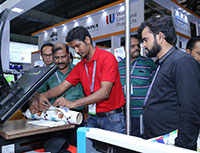 Messe Frankfurt India has announced the Screen Print India 2020 - New Delhi debut edition. The trade fair will be held from 21 – 23 August, 2020 at Pragati Maidan, New Delhi concurrently with yet another premier tradefair Gartex Texprocess India.
Messe Frankfurt India has announced the Screen Print India 2020 - New Delhi debut edition. The trade fair will be held from 21 – 23 August, 2020 at Pragati Maidan, New Delhi concurrently with yet another premier tradefair Gartex Texprocess India.
Messe Frankfurt India Trade Fair Pvt Ltd, the Indian subsidiary of one of the world's leading trade show organisers, Messe Frankfurt Exhibition GmbH, acquired the rights of Screen Print India in 2018. In 2019, Messe Frankfurt India and MEX Exhibitions enter into a strategic alliance to create Gartex Texprocess India, an integrated business platform for textile sector. Consolidating its expertise in the textile portfolio, Messe Frankfurt India, the leading trade fair organisers have announced that Screen Print India 2020 will make its debut in New Delhi alongside Gartex Texprocess India, thus bringing latest advancements and machinery in sectors like screen printing, textile printing, digital and sublimation under one roof.
“It is a tactical step to co-locate the Delhi edition of Screen Print India exhibition with the forthcoming Gartex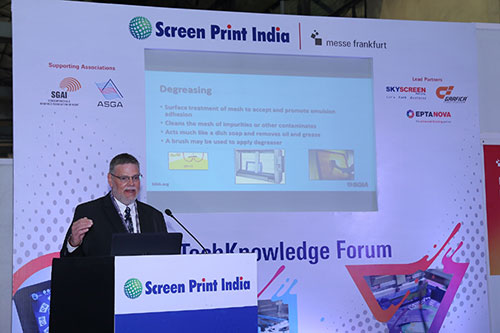 Texprocess India. This way, we are also able to offer a comprehensive product showcase to visitors across diverse categories within the garment and textile finishing sector in general and screen and digital printing sector in particular for this segment of buyers,” emphasized Mr. Raj Manek, Executive Director and Board Member, Messe Frankfurt Asia Holdings Ltd.
Texprocess India. This way, we are also able to offer a comprehensive product showcase to visitors across diverse categories within the garment and textile finishing sector in general and screen and digital printing sector in particular for this segment of buyers,” emphasized Mr. Raj Manek, Executive Director and Board Member, Messe Frankfurt Asia Holdings Ltd.
Moreover, like its Mumbai edition, Screen Print India New Delhi will also feature a special “SPI Sample Gallery” showcasing award winning pieces of screen printing excellence. Informative sessions and workshops will be conducted by various leading international experts on a wide range of topics related to the graphics industry.
Considering the potential of screen printing sector in India, the organisers are in talks with leading industry associations such as Screen Printing & Graphics Association of India (SGAI) to extend support and participation at the show. While the Mumbai edition continues to grow with surging figures in international participation, the Delhi edition of Screen print India is also expected to attract exhibitors from international borders. Owing to rapid technological changes, leading brands will conduct live demos of their latest technological offerings in screen printing, digital sublimation, heat transfer and textile printing, garment decoration to potential business visitors and traders.
Focused knowledge seminars throwing light on various processes and technical advancements is another highlight. Moreover, the show floor will display an array of product launches and live demonstrations to help decision makers and buyers invest in the right technology.
At the same time, Gartex Texprocess India, dedicated to the entire value chain of garmenting & textile manufacturing, is expected to give a much needed boost to the domestic industry. Various zones and focused segments ensure cross-sector, creative and collaborative interactions among the stakeholders; while the dynamic synergy will highlight the latest tech-advancements and trends that the country’s textiles and apparel industry is moving towards.
Following the WHO declaration that the Covid-19 outbreak is now a pandemic, Make it British Live! event has been postponed until further notice.
The number of cases in the UK is rising and is expected to increase dramatically over the coming days. This has increased the risk of contamination to the exhibitors, visitors and their families, by making the trip to the event.
In a press release issued by Make it British Live! they informed, “This is not a decision we have taken lightly and we have tried hard not to do this, but we no longer feel that the decision to keep 'business as usual' is in line with worldwide medical developments. By the time the event is due to take place we will be in the midst of a national emergency. Whilst we really want to continue with the event, we believe the right thing to do is to make this decision now to give enough time for everyone to cancel travel arrangements or hotels.”
But in line with the fact that the UK manufacturers need them now, more than ever, they are planning the Make it British Virtual Expo which will take place online at the end of May.
The virtual event will include everything that the live event does, including the conference, the networking and the workshops. Each exhibitor will have their own virtual booth that they will be able to ‘man’ for the duration of the show using a webcam that can be attached to any computer.
With this new arrangement, some of the international visitors, who might not otherwise have been able to attend, will now also be able to ‘visit’ the show, meet the exhibitors, watch the talks and network with other visitors.
And since there’s no longer any need to travel, exhibitors will be able to display a greater range of products and include more people from their teams than otherwise possible.
This virtual expo model, and the software platform chosen for it, has already proven to be successful for other large events and the organizers are confident that it will give the platform that UK manufacturers and British-made brands deserve.
For the first time ever, Kingpins ,a renowned denim trade show is holding an online event Kingpins24 in lieu of its popular Amsterdam show in April.
“When one door closes, another opens. We believe Kingpins24 can give our global industry a chance to connect and share information. We have no other desire but to be a conduit for the denim world during these difficult times, where most of us, including me, are at home far away from our normal world”, avers Andrew Olah, founder of Kingpins Show. We, as a whole, are resilient, resourceful and optimistic, he added.
The online event will provide a live stream of panels, interviews, casual conversations and on-demand content to educate the industry in an interactive way. Kingpins24 will go live at 9 a.m. CET (Central European Time) on April 22 and end by midnight on April 23.
The goal, however is not to take the place of the trademark Kingpins show. Instead, it will provide helpful content surrounding the denim supply chain’s offerings for the upcoming seasons with the same energy that attendees are used to.
The event will also include exhibitor content. Presentations will focus on sustainability and corporate social responsibility updates to ensure partners are still able to connect with attendees despite being situated around the globe.
"Though Coronavirus (COVID-19) outbreak is disrupting supply chains for mid-market apparels in China, it is also affecting luxury sales as most of these US-listed luxury brands are dependent on China for their business. China is a major producer of cotton, fabrics and silk. Its factories churn out everything from coats to swimsuits for fashion brands from Hennes & Mauritz and UK’s Next to higher-end designers such as Tory Burch."
 Though Coronavirus (COVID-19) outbreak is disrupting supply chains for mid-market apparels in China, it is also affecting luxury sales as most of these US-listed luxury brands are dependent on China for their business. China is a major producer of cotton, fabrics and silk. Its factories churn out everything from coats to swimsuits for fashion brands from Hennes & Mauritz and UK’s Next to higher-end designers such as Tory Burch.
Though Coronavirus (COVID-19) outbreak is disrupting supply chains for mid-market apparels in China, it is also affecting luxury sales as most of these US-listed luxury brands are dependent on China for their business. China is a major producer of cotton, fabrics and silk. Its factories churn out everything from coats to swimsuits for fashion brands from Hennes & Mauritz and UK’s Next to higher-end designers such as Tory Burch.
The outbreak has led to five of its designers cancelling their fashion shows for Paris Fashion Week next week while brands Chanel and Prada have postponed their events planned for May in China.
Brands activate contingency plans to contain epidemic
To mitigate these effects in the Chinese market, Kering’s brand Gucci recently live-streamed its catwalk show for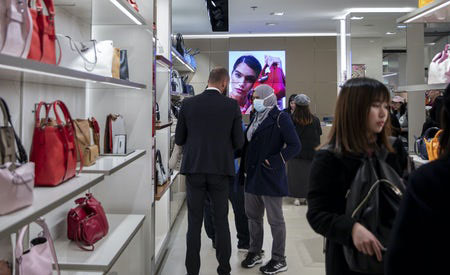 autumn-winter women’s collection in Milan, using Weibo, one of China’s biggest social media platforms. Viewers were also treated to a bird’s-eye view of the area where models were being made up. Several luxury brands also activated contingency plans that included closing stores and offices in China, scaling back product launches and advertising, and clamping down on staff expenses globally. This has created a somber mood across the country which is preventing conspicuous consumption.
autumn-winter women’s collection in Milan, using Weibo, one of China’s biggest social media platforms. Viewers were also treated to a bird’s-eye view of the area where models were being made up. Several luxury brands also activated contingency plans that included closing stores and offices in China, scaling back product launches and advertising, and clamping down on staff expenses globally. This has created a somber mood across the country which is preventing conspicuous consumption.
Delivery disruption to delay A/W collections
Retailers who follow a traditional two-season model with long lead times, have already dispatched most of their stocks for spring and summer. However, manufacturing and dispatch of autumn/winter stock is likely to be disrupted due to delayed return to work in China after the lunar New Year. Next has about £20 million inventory at risk in China as a delayed delivery to retailers is likely to result in the clothes arriving too late for the intended season and being marked down to sell.
Fast-fashion brands such as H&M and Zara usually have a diverse supply base in North Africa and Turkey and can shift volumes from one supplier to another which protects them against the disruption in China.
However, as Edited, a London-based retail data analytics start-up reveals, shipments of mass-market clothing from China to the US and UK are likely to fall by 3.5 per cent this year. New York-based company Hilldun Corporation is also worried about its designers missing their delivery deadlines, which will compel them to fly their products instead of shipping them. This will further intensify the insecurity for both Chinese factory owners and brands across the world.
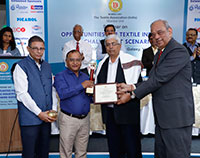 The Mumbai unit of the Textile Association (India) organised a One-day seminar on “Opportunities for Textile Industry in Challenging Scenario” on February 29, 2020 at Hotel fortune Park Galaxy, Vapi (Gujarat). The seminar was inaugurated by Rajnikant S. Bachkaniwala, Chairman, Palod Himson Machines.
The Mumbai unit of the Textile Association (India) organised a One-day seminar on “Opportunities for Textile Industry in Challenging Scenario” on February 29, 2020 at Hotel fortune Park Galaxy, Vapi (Gujarat). The seminar was inaugurated by Rajnikant S. Bachkaniwala, Chairman, Palod Himson Machines.
Rajnikant S. Bachkaniwala, Chairman, Palod Himson Machines delivered the inaugural address. “Where there is a crisis there is an opportunity. The Global Corona virus problem in China provides the Indian textile industry with an opportunity that we should not miss,” he said.
GV Aras, Director, Textile Engineering Group, ATE Enterprises delivered the key note address. According to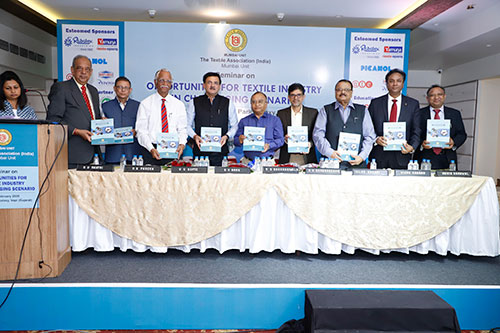 him, though the textile industry offers many opportunities, industry leaders have not been able to grab them as we don’t have the capacity for bulk manufacturing. “Lack of logistics and disintegrated activities in the textile industry is increasing the cost of products in the industry,” he said. He further viewed that the ongoing coronavirus epidemic in China is impacting production in the country, which gives Indian industry multiple opportunities to increase productivity and and capture the international market.
him, though the textile industry offers many opportunities, industry leaders have not been able to grab them as we don’t have the capacity for bulk manufacturing. “Lack of logistics and disintegrated activities in the textile industry is increasing the cost of products in the industry,” he said. He further viewed that the ongoing coronavirus epidemic in China is impacting production in the country, which gives Indian industry multiple opportunities to increase productivity and and capture the international market.
A. A. Bambardekar, Works Director, Raymond (Textile Division Vapi), urged industry leaders to adopt new technologies to reduce their production costs. He also urged young students to enter the textile industry as they can help it grow through their innovative ideas.
The Textile Association (India), Mumbai Unit felicitated Madhubhai Mangukia, Chairman & Managing Director, Yamuna Machine Works with “The Lifetime Achievement Award” and Haresh Panchal, Managing Director, Rabatex Industries with “The Industrial Excellence Award” for their outstanding contribution in the field of textile industry.
The seminar ended with a panel discussion on the topic ‘Developments in Textile Industry to meet Emerging Market Trends. Moderated by Rajiv Ranjan, ED & CEO of Hindoostan Mills, the discussion focused on radical thoughts from the textile industry that would help the textile industry.
With the fashion industry being considered one of the world’s most polluting businesses-sectors, collaborating and knowledge sharing are key in finding solutions for a better future. Fully aware of this scenario, for the second year running, ISKO was the headline sponsor at Drapers Sustainable Fashion Forum, the authoritative event bringing together the most responsible players to discuss what can be done to tackle the industry’s environmental and social issues through innovation and creativity.
Sharing knowledge, collaborating for change
As evidence of its pioneering Responsible Innovation approach, ISKO shared its founding values of creativity, competence and citizenship by showcasing the R-TWO program, its latest responsible achievement, in a dedicated stand. Stemming from the mill’s holistic vision, R-TWO represents a great example of how reducing, reusing, and recycling strategies can be implemented in a textile business to improve its environmental performance. With the goal to create fabrics that can provide both quality and responsibility, ISKO has developed this platform, which deals with the most critical issue that apparel supply chains are currently faced with: using more than what actually needed. To this end, R-TWO reduces the amount of raw material sourced by using a blend of reused cotton and recycled polyester – both certified –, improving sourcing efficiency throughout the entire field-to-fabric production. This cutting-edge program effectively tackles over-sourcing – the leading issue when it comes to waste hierarchy. Reused cotton is certified with the Content Claim Standard – or CCS – from the Textile Exchange. As for recycled polyester, it can be either Recycled Claim Standard (RCS) or Global Recycled Standard (GRS) certified, depending on the content percentages. Together with this cutting-edge and fully responsible program, ISKO also uses automated laser technology developed in partnership with Jeanologia. At the event, ISKO incorporated this forefront solution into its stand, where guests could receive a personalized denim apron, showcasing this entirely responsible innovation.
How technology can help make the fashion industry more sustainable”: a special panel featuring ISKO
On March 11th, ISKO hosted a power talk on the event’s main stage. The discussion explored some of the pioneering advancements in technology that are making the fashion industry more responsible. From automated laser technology to integrated waste management processes and field-to-garment tracking systems, a selection of speakers illustrated how these achievements are reshaping the fashion industry. The panel was moderated by David Shah, internationally renowned consultant on design and marketing development, Publisher and CEO at Metropolitan Publishing BV and Associate Professor at ARTez (Arnhem, the Netherlands) and Associate Professor at Renmin University, (Beijing, China). The talk involved Keith O’Brien, ISKO Marketing & Business Development Manager, Victoria Soto, Jeanologia Custom Technology Consultant and Filippo Ricci, Fashion Open Studio Program & Partnership Manager. “Stepping up together is essential, when it comes to the development of better practices,” claimed Keith O’Brien, ISKO Marketing & Business Development Manager. “This is not something we can deal with alone, we need to rise up as one and be consistent in our quest for new, responsible solutions.”
A section of international buyers has informed Bangladeshi apparel exporters that they would reduce their existing export orders by 15-30 per cent amid an adverse impact of coronavirus outbreak in China and its subsequent spreading to many other countries across the world.
The government is assuring about all types of policy support to exporters to face the impact. Some buyers are requesting to make air shipment of export products while the others are seeking discount on prices The BGMEA also requested the Bangladesh Bank to extend all-out support so that exporters did not face any problem in banking related to release of goods which were now reaching the country after delay due to the outbreak.












